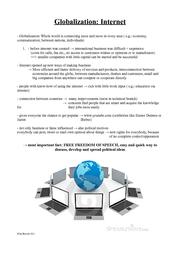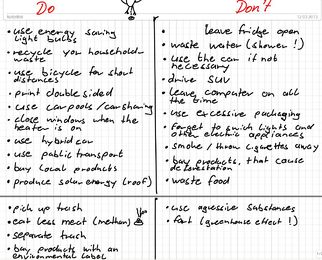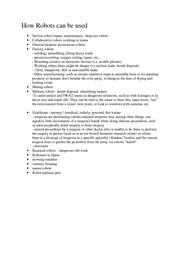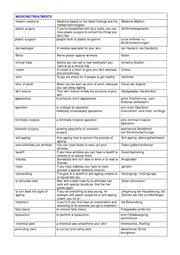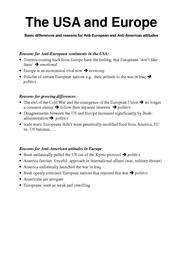colloquium2014: Unterschied zwischen den Versionen
K (→Text: Brand Aid) |
K (→The role and image of the USA since 1945) |
||
| Zeile 444: | Zeile 444: | ||
* Germans were not allowed to have and learned to feel ashamed of patriotic feelings → easy to take over Western/US mass culture | * Germans were not allowed to have and learned to feel ashamed of patriotic feelings → easy to take over Western/US mass culture | ||
* US culture meant luxury, affluence, freedom, individualism | * US culture meant luxury, affluence, freedom, individualism | ||
| + | <br> | ||
| + | |||
| + | <u>'''3. What negative aspects of US culture spreading everywhere are mentioned?'''</u> | ||
| + | * USA only imports/uses cultural products from other cultures and repackages/resells them as its own US culture | ||
| + | * USA eliminates/replaces other countries’ cultures by spreading its own culture around the world, advertising and marketing (music, movies, language) | ||
| + | * USA looks down on other countries => no exchange of cultures but a colonisation | ||
| + | * boring standards of hogeneoneous culture everywhere | ||
| + | <br> W | ||
| + | <u>'''4. What make si it so easy for US culture to be dominant/spread?'''</u> | ||
| + | * English is an easy language (easy grammar and vocabulary) and easy to learn => world language | ||
| + | * culture presented in English => big audience worldwide | ||
| + | * everybody can connect to American films because they are as multicultural as American society | ||
| + | * American culture isn’t really foreign for most people because it was merged from other cultures ( of different immigrants, black slaves) | ||
| + | * big population in the US (to test/refine products which are then sold worldwide) | ||
| + | * just „dominant“ cultures survived the mix | ||
| + | <br> | ||
| + | |||
==The USA and Europe - increasingly difficult relations?== | ==The USA and Europe - increasingly difficult relations?== | ||
| Zeile 450: | Zeile 467: | ||
[[Datei:USA-EU.pdf]] | [[Datei:USA-EU.pdf]] | ||
| − | |||
| − | |||
| − | |||
Aktuelle Version vom 16. Mai 2019, 23:44 Uhr
Inhaltsverzeichnis |
Muslims in Britain
Texts
- Problematic issues between British Muslims and the "Christian" majority
- A problem of perception: Muslims are well-integrated in Britain – but no one seems to believe it
- Reflections of a Former Islamist Extremist
- Read from beginning to "And it's a very powerful grip on one's mind. And in my case it took years to shed that influence." (third box)
- Answers to book, p. 86/87 q. 5 + 6
- Why does a young muslim turn into an extremist?
- crucial event: death of thousands of European muslims in war in Bosnia in 90s! West just watches and doesn't help the muslims there. (Parallels to wars in Iraq .... muslims are being killed and no-one cares)
- Islam is cleverly presented as way of looking at history: like in Marxism it is always a struggle, them against us, bad against good, everybody against the muslims (idea of Western/Jewish conspiracy against Islam/muslims)
- at school/in university young muslims become part of an active, organized, outspoken movement ⇒ proud to be an active muslim, feeling of power, feeling of belonging to group and of changing the world.
Cartoon ⇐Klick!
- 4 frames, three show acts of violence/hatred committed in the name of Christianity/Western Civilization
- evangelical pastor [=church] burning Korans, evangelical/conservative politician [politics] against building mosque in USA, secret service agent [=government] torturing terrorist suspect)
- irony: they all want revenge/act as unchristian/intolerantly as those they accuse of doing this to them
- irony: preacher is completely stupid: of course "them folks don't act like Christians" - they simply aren't christians!
- preacher also doesn't seem to know his Bilble: "Jesus hates Mohammed" is absolutely like anthing Jesus preaches in the Bible: Jesus preaches love, peace and forgiveness - not hatred!
- picture four shows the result: children in USA have learned, that you needn't act as you wish others to act towards you (in civilized way, mercyfully, helpfully, tolerantly ...) but can do anything you want as long as nobody stops you.
- General criticism: christian/western preachers and politicians and governments do the same things they accuse terrorists and radical islamist of ⇒ they are no better than them.
Globalization
Definition and Key Facts
Cf. Book, p. 178
History / 3 Phases of Globalization
Globalzation 1.0 (first phase/era) - 1492 (Columbus) until around 1800
- world got connected, shrank from size L to M
- trade between Old World and New World
- countries' power defined by use of horse power/wind power/steam power/ (horses, ships, engines)
- aim: to fit into global competition
- motivation often religion / imperialism
Globalization 2.0 (second era) - 1800 to 2000
- interrupted by the Great Depression, World War I and II
- world got more connected, shrank from size M to S
- industrial revolution and multinational companies (e.g. East India Company) as most dynamic forces
- global integration ⇐ breakthroughs in hardware development
- 1. falling transportation costs (steam engine, railroad, cars, airplanes)
- 2. falling telecommunication costs (telegraph, telephone, PC, satellites ...)
- development of really global economy ⇒ massive movement of goods and information
Globalization 3.0 (third era) - from 2000 to …
- world got even more connected, shrank from S to XXS and countries got even closer
- newfound power for individuals to communicate, collaborate, compete globally
- key developments:
- - fiber-optic cable + Internet + work flow software + mobile computing
- - final end of simple East/West division
- ⇒ very small, flattened world/playing field (many forces on same level, even individuals are very powerful)
- - China has become more powerful
- - now much more diverse, non-white, non-European influences ⇒ West no longer dominant in globalization
Source: Friedman. The three eras of globalization (Book, p. 176f)
Pros and Cons
- Globalisation: Pro - Con 1
- Globalisation: Pro - Con 2
- Book, p. 178
Globalisation and the Internet
Globalization and culture
- http://en.wikipedia.org/wiki/Globalization#Culture
- http://independent.org/newsroom/article.asp?id=2258
- http://www.globalization101.org/uploads/File/Culture/cultall2011.pdf
Ecology and Protecting the Environment
How green are you?
- Look at How green are you?
- Look through the test again an create a simple list of dos and don'ts!
- Prepare a short talk about at least 4 environmental dos and don'ts and tell people about your favourite!
Environmental DOs and DON'Ts
Zum Vergrößern mehrfach klicken und dann speichern ...!
Saving the rainforests, Global warming and use of energy
- See our blog http://howgreenisourfuture.wordpress.com, especially the chapters on "global warminfg" and "energy".
- See this blog http://no2deforestation.wordpress.com, especially the two chapters on "effects/risks" and "solutions".
The Hobbit - a Fantasy Novel classic by J.R.R. Tolkien
- Cf. your scrapbook + worksheets + notes that you took while we were reading it in class. Especially look at the two concepts of the hero, at Bilbo and Thorin ...!
- Reasons for reading Fantasy:
- Why the hobbit is so successful:
Using Robots
- Using robots today ...
- New wave of adept robots is changing global industry
- How robots can be used:
Effects of using robots ...
Summary of the two articles:
Advantages of using robots:
Military robots:
- advantage in war
- unlimited supply of robots
- fewer in human lives lost
- more effective use of weapons than human soldiers
- rms race in robotics has begun → US a must keep advantage in this field
- Machines: no negative or strong emotions
- better at quick, rational decision-making
- more rational/calm and ethical decisions (no anger, revenge) is
Household robots
- save time/work/do boring and dirty jobs ⇒ useful helpers
- can be used to control home/house remotely
Problems/dangers of using robots:
Military robots
- Sufficient ability to identify proper targets/combatants?
- right to decide about acceptable human collateral damage?
- inability to show mercy/give pardon
- who is responsible if robot kills wrongly
- technical ability to kill and destroy is more easily developed than more role/ethical control-mechanisms
- dangerous, 100% obedient tool in the hands of dictators etc.
Household robots if hacked, they could be illegally used to
- control our homes
- spy on us
- attack us
.
Text: Programmed for Love (Man loves Robot?)
- The original text on the problematic relations between people and robots can be read here!
Answers to questions 1 and 3 on worksheet:
1. Headline makes reader wonder:
- programmed (technology) ⇐⇒ love (emotion)?
- programmed: no choice, no free will ...
- who is programmed for love? (Assumption: a robot/computer/machine?)
- Reader curious to answer the question/find connection between technology - emotion
After reading that human beings, and not machines, here are programmed in such a way that they fall in love with robots ⇒ surprise ⇒ interest ... How can that be - "to have" to love a robot due to being programmed to do so?
3. Change in author's attitude to robots:
first/before
- enthusiastic about new technologies (MIT)
- believed in benefits of creating alternative identities in virtual life
- studied human interactions with computers
then / after (encounter in which she realized she wanted the robot's attention, reacted to simple signals of communication) against man - robot relations on an emotional basis as:
- Robots can malfunction
- afraid that machines play role that only humans should play
- it damages our sense of humanity
- robots don't love you back, even if the promise
- people give up establishing and having relationships with real people
- Outlook: Will robots change us?
Improving yourself: The human body as a piece of art:
Plastic surgery: statistics
Plastic Surgery for Men:
- want to have more success in jobs
- want to attract younger women
- want to have an image of vitality
- makes them feel better
- to look more attractive
- to get attention from other people
- to look young, fit, with good reactions and professional
- to bring out their character
- to prevent prejudice
Cf. Worksheet/mediation on plastic surgery for men
Plastic Surgery for Women:
- to look like the women in the media
- everybody does it
- prices go down
- feels good to get told that they look good
- to improve their self-confidence
- to remind themselves of the good times
- people don´t like themselves because they are brainwashed by the media
- to be more attractive to men
- to get better job chances
- youth shows fertility
- to wear the newest dresses ( fashion ) ????????
Plastic surgery for teenagers: Video
- Plastic surgery performed on teens in the USA: Motives, views and attitudes, effects and problems covered by this video clip ...!
How much do looks count today? (Cf. worksheet/handout)
- Looks count ... Text on worksheet, too!
- Looks count more than skills at work (and that goes for men too). Text on worksheet!
Topical Vocabulary
Vocab sheet on plastic surgery / youth cult:
Obesity in the USA
Reasons for obesity:
- medical/biological disposition or use of medication (rare)
- unhealthy food cheaper than healthy food
- too much salt, sugar and fat
- people eat a lot of sugar without knowing
- sugar increases your appetite
- cornfructose is a very cheap + good tasting ingredient
- labels like smart choice make things worse, as they make people eat more and as they advertise fat free food, but fat is replaced by sugar
- we do not only eat when we are hungry
- we do not think about how much and what we eat
- marketing of cheap / high-calorie/sugary food and extremely large portions
- insufficient physical exercise compared to amount of food we eat
Effects of obesity:
- high cholesterol + and blood-sugar ==> heart diseases, diabetes, stroke,
- various cancers, massive diabetes
- problems with joints (knees, ankles, hips) due to massive overweight
- reduced life-expectancy
- health care costs and costs of unemployment, long-term-illnes and care for extremely obese people increase dramatically
- problems with public transport, travel, etc. => loss of mobility
- severe limitations / loss of quality of life => depression, isolation
Possible solutions:
- more exercise/sports
- eat more low calorie food
- legal steps against hidden sugar, oversize portions, … for better information on labels of food we buy
- instruct kids in school + change school lunch
- teach people about consequences and responsible eating (portion sizes, sugar intake, ...)
- make children walk to school instead of going by bus
- local restaurants can change their menus + portion sizes
- drink less beer and high-sugar softdrinks
Other material:
Why our food is making us fat
- It's the sugar ...
- Fighting obesity Watch the embedded video!
- Cf. cartoons on obesity, e.g. here!
.
Society and Class in the UK
Definitions of "Class" in Victorian Society
Victorian Class System
| Victorian Society = 3 classes: upper, middle, and lower/working |
|---|
|
Upper class = nobility, or peerage (dukes, earls, viscounts)
|
Class today - The class system redefined
- BBC Science: The Great British Class Survey – Results Look at the embedded video!!!
The role and image of the USA since 1945
| Typical Americans are .... / Typically, in America you find ... / In America "they" believe in ... |
|---|
|
Cartoons on US Cultural Hegemony / Americanization
- Cartoon on Americanization and Notes for analysis of this cartoon!
- Cartoon of President George W. Bush as Cowboy
- Working with Cartoons
Coursework: Text on US Cultural Hegemony
1. What reasons for anti American feelings in Europe does the text give?
- American culture ousts European culture
- German or other European languages are being flooded with English terms and expressions
- Sense of national identity severely disturbed
- Europeans are afraid of loosing their cultural autonomy
- European culture replaced by American culture
- Vietnam-war
- Guantanamo Bay and Abu-Ghraib
- Americans ignore and don't know about European culture
- American worldview is centered on America
- Americans expect everyone to think and speak American
- Americanization as cultural imperialism
2. Why has Germany been especially quick at embracing American culture?
- America's help after WWII (→ Marshall Plan, Airlift that saves Berlin) ==> Germans felt grateful
- German culture discredited by Nazis, German from "Dichter und Denker" to "Richter und Henker"
- Germans looked for new cultural model → culture of the victoriuos, democratic and successful USA
- Germans were not allowed to have and learned to feel ashamed of patriotic feelings → easy to take over Western/US mass culture
- US culture meant luxury, affluence, freedom, individualism
3. What negative aspects of US culture spreading everywhere are mentioned?
- USA only imports/uses cultural products from other cultures and repackages/resells them as its own US culture
- USA eliminates/replaces other countries’ cultures by spreading its own culture around the world, advertising and marketing (music, movies, language)
- USA looks down on other countries => no exchange of cultures but a colonisation
- boring standards of hogeneoneous culture everywhere
W
4. What make si it so easy for US culture to be dominant/spread?
- English is an easy language (easy grammar and vocabulary) and easy to learn => world language
- culture presented in English => big audience worldwide
- everybody can connect to American films because they are as multicultural as American society
- American culture isn’t really foreign for most people because it was merged from other cultures ( of different immigrants, black slaves)
- big population in the US (to test/refine products which are then sold worldwide)
- just „dominant“ cultures survived the mix
The USA and Europe - increasingly difficult relations?
The results of your work on the two texts on the relations between the USA and Europe:
